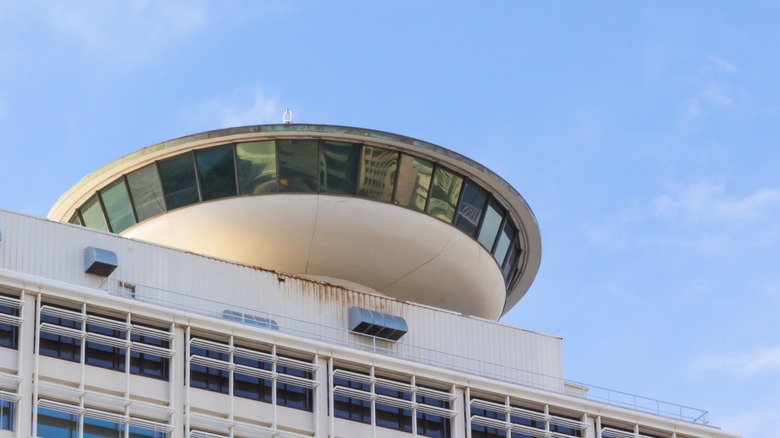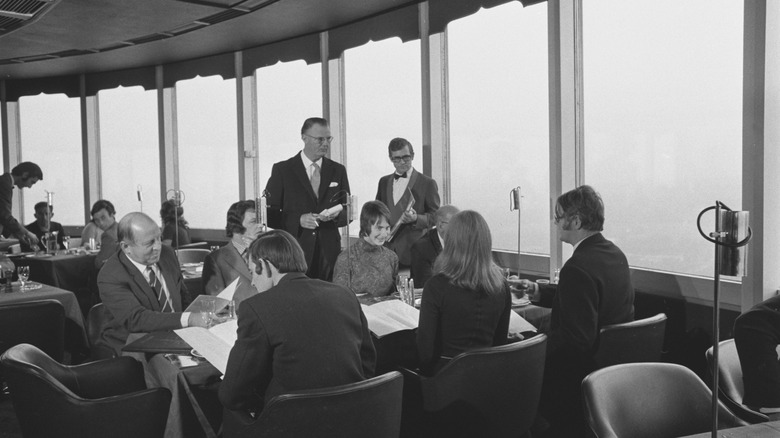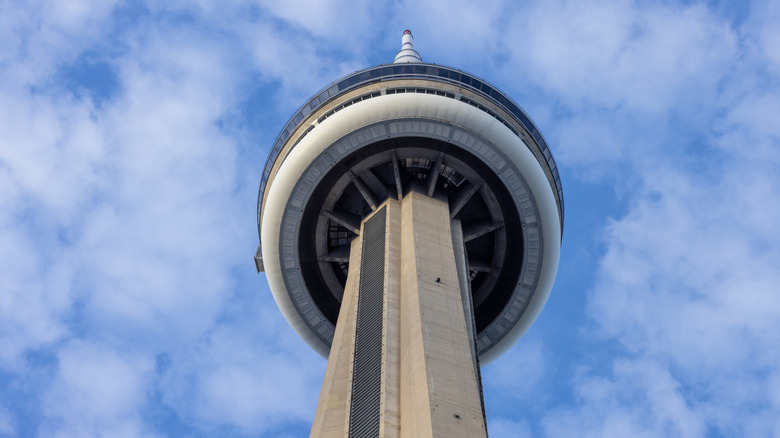In spirit, the revolving restaurant is pretty fun: You sit down at a table, right next to an extra-large window. As the server pours waters and asks how you are, you see an urban skyline spread out below you. By the time the appetizers arrive, the horizon has shifted; you see new buildings, parks, and highways. The main course is set down, along with a second glass of wine, and the view is completely different; now you face the setting sun. So it goes, round and round, all through your dinner. The circular space moves slowly, imperceptibly, but over the course of an hour, you’re treated to a 360-degree panorama.
This was all the rage in the 1960s and ’70s, when revolving restaurants offered a “Jetsons”-like vision of the future. They had all the trappings of mid-century architecture: smooth lines, huge panes of glass, and an open-concept interior. Like hot rods with fins and 3D glasses at the movie theater, revolving restaurants hinted at an exciting, automated world of tomorrow. Even today, architecture fans love to spot them, as they seek out the tallest buildings, best bridges, and most beautiful homes in America. However, these restaurants were also a fad that wouldn’t stand the test of time; they started to fall out of favor in the 1980s, and few new restaurants have been built since.
But what goes around, comes around. In 2024, San Francisco restaurant The Equinox started to turn once more, after 18 years of standing motionless. A major restaurant group is also reopening the revolving restaurant The View in New York City, injecting new life into the once-passé concept. Many will delight in this historical full circle, blissfully unaware of the accident that gave such restaurants a bad name.
A cyclical history of the revolving restaurant
Historians generally agree that the Florianturm in Dortmund, Germany, was the first revolving restaurant, established in 1959. The choice of location was a little odd: The Florianturm was a spindle-like TV tower, and the eatery was installed as an afterthought. But the concept captured architects’ imaginations; just three years later, the Space Needle received its grand opening in Seattle to celebrate the 1962 World’s Fair. This set off a domino effect, as architects raced to build more and more circular restaurants with giant motors in their centers. This kind of high-flying engineering suited the Space Age aesthetic, allowing patrons to dine in the sky — and take in the view from every possible angle.
Many of these restaurants are still operational. Macton, the premiere developer of restaurant turntables, claims to have installed over 100 still-active revolving restaurants around the world. But as with many architectural fads, enthusiasm for this technology has ebbed. The machinery required a lot of space and energy to operate, and most of these restaurants are prohibitively expensive for the general public. Like mood rings and waitresses on roller skates, revolving restaurants were seen as a little hokey. You could easily add some to a list of tourist traps to avoid.
The gimmick is now haunted by tragedy as well: In 2017, a five-year-old boy was killed in a freakish accident at the Sun Dial restaurant in Atlanta, Georgia. Not only did the child get stuck between tables — a so-called “pinch point” — but the machinery allegedly failed to stop moving. While this kind of tragedy is nearly unheard of, the incident proved fatal and resulted in a well-publicized lawsuit. The family agreed to a settlement in 2021, but the death has haunted this genre of restaurants ever since.




